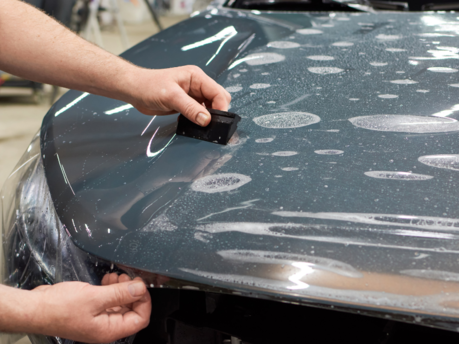A guide to getting your car wrapped
Transforming your ride — tips for customising with vehicle wraps
If you’re looking to personalise your car, it’s possible to go a bit further than a private plate and a set of fluffy dice without shelling out for an entire respray. Yes, we’re talking about vinyl wrapping, a way to completely transform your car without the permanence and expense of a whole new paint job. So what do you need to know? Here’s our guide to getting your car wrapped…
What is car wrapping?
Wrapping your car means changing its appearance through the use of adhesive vinyl, which can be applied over your paintwork and mold to the contours of your car like a second skin. In fact, when done correctly using careful application of the correct type of vinyl, it’s hard to tell that it’s not been repainted.
Why get your car wrapped?
There are several great advantages of having your car wrapped over getting it resprayed — here are the main ones…
1. Protect the original paintwork from cosmetic and UV damage
Driving your car on a daily basis doesn’t just cause wear and tear to the mechanical elements of it; it can take its toll on the paintwork too. Dust and pollutants can damage your paintwork over time, and the UV rays from the sun can set about fading even the boldest of colours.
Wrapped in vinyl, your original paintwork is protected from the harsh realities of life on the road, ready to be revealed again at some point in the future. If this is your main goal but you still love the colour of your car, you can invest in transparent wrapping, which simply acts as a layer of protection to your paint.
2. Endless personalisation
Fancy a matt black car? Go-faster stripes? Or maybe you love the car, but just wish it was a different colour. The vinyl wrap comes in a variety of different styles, colours and finishes so that you can get the look you’ve always dreamed of.
3. Cheaper than a respray
To respray your whole car, you’re looking at thousands, not hundreds of pounds, and you could be paying upwards of £5000 or even more. Vinyl wrapping comes in a little more affordably, thanks to the reduction in labour costs. Whilst it’s still not a cheap thing to invest in for your car, it will almost always work out cheaper than a respray.
4. Advertise your business
If you’re going to be stuck in traffic, you may as well be advertising to that captive audience! Vinyl wrapping can be a great way to advertise your business, as the wrap can be customised with text and images, bringing your logo to the roads of your local area without a blowing your budget on a billboard.
Can you wrap your car yourself?
Technically you could, but we’d strongly recommend that you get a professional to do it. Here’s what car wrapping requires:
1. Super accurate measurements
Getting the right dimensions of every part of your car is essential to getting a good vinyl wrap finish — after all, it has got to fit like a glove. Knowing what measurements to take and being able to take them accurately is the skill of any good vinyl wrap professional.
2. All the right tools
To get a flawless wrap, there are a few things you’ll need in your tool belt. These include:
- Scalpels
- Lint-free cloths
- Magnets
- Heat gun
- Infrared thermometer
- A squeegee that suits the wrap you’re using
- A snitty (a special kind of safety cutter)
3. The right environment
You’ll need a room in which the light is perfect to see all of the car properly — and it needs to be completely dust free. This isn’t all; the temperature of the room should be between 18-22 degrees Celsius. Any hotter, and the vinyl will stretch. Any colder, and the vinyl could shrink. It’s a delicate balance!
4. The correct preparation
Your car needs to be spotlessly clean, and free of any cosmetic marks that might hinder the vinyl’s application, such as dents and scratches. It takes an experienced and professional eye to be able to tell when a car is ready to be successfully wrapped.
What can happen if the vinyl wrap isn’t fitted correctly?
The telltale signs of a poor or incorrect car wrap include:
- Rust from moisture trapped under the vinyl
- Scratches and dents from cutting the vinyl to size and pressing too hard in the wrong places
- Air bubbles under the surface
How long does vinyl wrapping last?
If applied correctly, vinyl wrapping can last around 3-5 years. When you want it removed, simply head back to a professional, who will be able to remove it without damage to your paintwork, usually using a heat gun.

